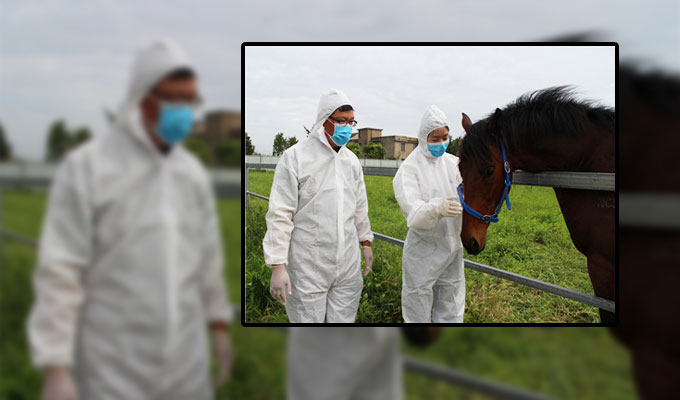A batch of 31 Australian race horses has successfully passed a 30-day quarantine inspection at the new Qidong Port inspection centre, located near Nantong in eastern Jiangsu Province, marking the first time Nanjing Customs has worked in affiliation with Qidong Customs in order to carry out isolation quarantine, specifically for the handling of race horses.
As the horses are now dispersed to various buyers across the country, the only cloud on the horizon for the equestrian industry in China is the authorities’ potential viewing of the sport as as a little too “nouveau riche”.
Building of the new inspection centre began in February of 2018, with official approval coming in May. Last month, Qidong (Nanjing) Customs and a team from Shanghai Airport Customs worked together to complete the quarantine of the 31 horses. After 30-days, a Certificate of Inspection and Quarantine of Entry Goods was issued, reported the Yangtze Evening news.
While gambling remains illegal in China, equestrian sports have seen a dramatic increase in popularity over the past 10 years. In 2010, the number professional clubs had more than quadrupled in just 2 years, as recorded by the China International Horse Fair.
According to Research International, there are now more than 400,000 amateur riders and 9 million horses in China, with investment in the equestrian industry increasing at 15 percent to 20 percent every year. Chinese customs has recorded that, since 2012, more than 2,000 horses have been imported into China.
A handful of European countries, as well as nations such as Australia, have been granted official trade agreements for the export of horses to China, where huge investments and business opportunities are behind a healthy industry.
Dutch horse exporting company Horse Services notes, “As a westerner you will have to sell not only the horse, but also knowledge and experience; how to maintain the horse, nutrition, training, medical care, transportation and many other things that are important to keep a horse well. However, your invested energy can lead to long-term cooperation [with Chinese investors] in the future”.
Horse clubs such as the Inner Mongolia Rider Horse Group, the China Horse Club and the Beijing Equestrian Association have become desirable organisations of which to be members; recruited high-profile business people, Sheiks, and VIP International and Chinese only add to the appeal.
“As a member, you will enjoy exclusive investment opportunities across a range of industries including real estate, commercial business, elite thoroughbred stallions and mares as well as racehorse prospects”, the China Horse Club website states.
The China Horse Fair recorded that the Inner Mongolia Rider Group has imported the largest number of horses so far; 832 from New Zealand. Elsewhere, in September 2017, the China Horse Club spent ¥12.14m to buy a 1-year-old horse at the Irish Thoroughbred Auction.
“To capitalise on the growing Chinese market, the horse export tariff from Australia decreased from 10 to 8 percent on 20th December 2015, and will decrease 2 percent annually from then on. In 2019, there will be no tariff for horse export from Australia to China”, say Fair organisers in regard to the Free Trade Agreement between the two countries.
The China Horse Fair also notes that, “In May 2015, the Australian Kylin Horse Co. announced that they are entering the Chinese market and is creating an online investment platform for race horses. And [in] 2016, Australian Magic Million [planned] to sponsor a series of competitions in China, while Inglis another auction company from Australia is going to support Chinese competitions”.
In Nanjing city alone, ¥60m has been spent building the country’s largest equestrian club.
Horse racing and equestrian sporting culture certainly looks as if it has a bright future in China as not only a thriving opportunity for investors, but for horse lovers too. Somewhat similar to elsewhere, the riding of horses and involvement in such an industry in China can not only bring in the cash, but the status too.
So it was also once thought of golf. With participation in that particular sport by government officials very much frowned upon, and the unlikelihood of new golf courses being built, so those betting on horses in China would fare well to cash in quick.









